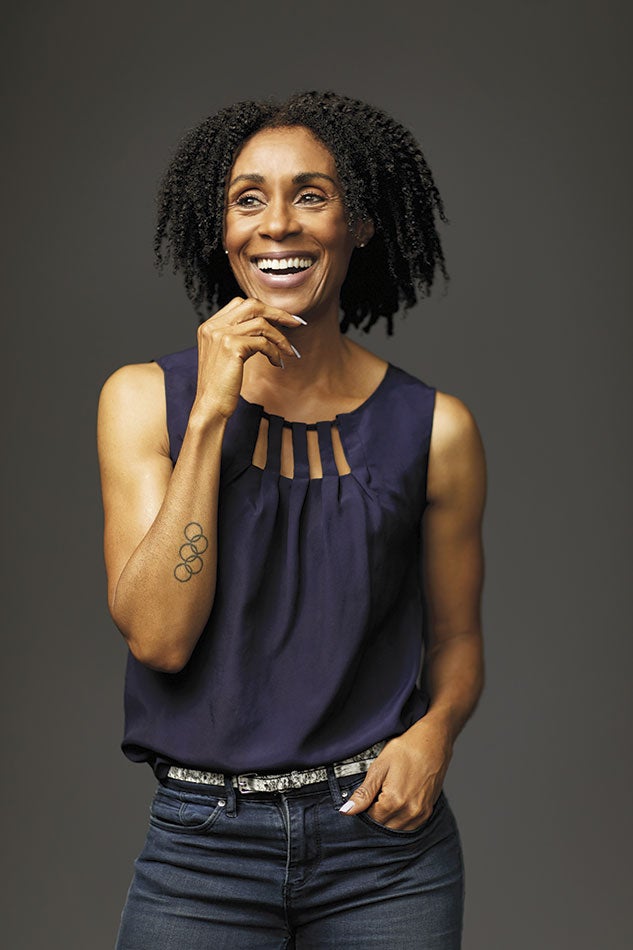Olympic Spirit
Rosey Edeh has been clearing hurdles on and off the field since coming to Rice.
When Rosey Edeh ’90 studied art and art history at Rice, she could often be found behind a camera, one of her photographic subjects being the campus’s historic architecture.
But with such a full life, there are iconic photos of Edeh that we would want to take: That of a smiling teen with several track and field medals hanging from her neck, the hurdler reacting to breaking a Canadian record in one of her three Olympic appearances and, of course, the alumna being inducted into the 1996 Rice Athletic Hall of Fame.

We would also include photos of her different media personas: TV sports reporter, CNN meteorologist, “Entertainment Tonight Canada” reporter and Toronto TV reporter jogging alongside the premier of Ontario during her morning run. Most recently, Edeh wrote and directed a documentary film capturing a farewell concert for a Montreal jazz legend.
Growing up in Montreal, Edeh’s Nigerian-born parents insisted their daughter stay active. “They were typical immigrant parents,” she says. “They’re like, ‘I’m working hard. So you think you’re going to just sit around and watch TV?’”
Her local and national track and field wins led to a California State University, Fresno scholarship. However, the gap between the frequent first-place runner and her competitors had her looking for tougher challenges. She had heard about Victor Lopez, the Rice women’s track and field coach who would go on to produce 18 national champions during his 26 years at Rice. She transferred to Rice and spent a year “redshirting,” meaning she could train but not compete. Her year did not suffer from that restriction.
“I loved Rice from the moment I got there.” She marveled at its architecture and was taken with the caliber of athletes. After a year of running mostly sprints, she and Lopez decided that Edeh should try hurdles, an Olympic sport that had recently begun accepting women. “I trained and raced, trained and raced, and sat in a bucket of ice,” she says, referring to the inevitable shin splints. She describes each hurdle stride as a deep, personal drumbeat. Soon she was setting Rice records in both the 100-meter and 400-meter hurdles. But the other drumbeat she was hearing in 1987 was of the upcoming Summer Olympics.
The novice hurdler would make it all the way to the 1988 games in Seoul to compete for Canada. Still an undergrad at the time, she found time to work on an anthropology research project for Stephen Tyler (now the Herbert S. Autrey Professor Emeritus of Anthropology and Linguistics) while there. “We had some downtime before the competition began,” she says, “and researching Buddhism in South Korea was a great distraction.”
She later qualified for the 1992 and 1996 Olympics and set and repeatedly broke a Canadian record in the 400-meter hurdle. Her 1988 record stood for 35 years — until last October.
She earned that record one year after giving birth to daughter Micha, whose father is former U.S. Olympic long jumper Mike Powell. Micha also became an athlete and Olympian on the 4x400-meter relay team in Rio de Janeiro in 2016. When Micha was young, Edeh took up TV broadcasting, the highlight being 10 years with “ET Canada,” conducting about 1,000 celebrity interviews. She later worked in local news in Toronto and through her company, Micha Muse Media, wrote and directed a documentary film, “Oliver Jones: Mind Hands Heart,” on legendary jazz pianist and fellow Montrealer Oliver Jones.
Her drive was learned on the track and continues off the field. Edeh recently signed on as a contributor to byblacks.com, an online magazine serving black Canadians. And once social distancing measures due to COVID-19 have been lifted, she plans to shoot more video interviews, such as one she recently did of R.T. Thorne, the creator of “Utopia Falls,” for the magazine. “You don’t really give yourself another choice,” she says. “You let those dreams take you.”
